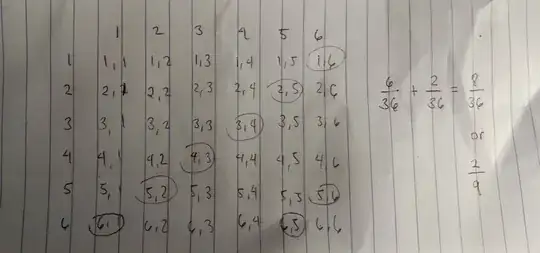In general, the problem of restricted partitions is quite difficult. I'll frame the problem in a more general setting:
Suppose we have $n$ dice, having $k$ faces numbered accordingly. How many ways are there to roll some positive integer $m$?
This problem can be de-worded as:
How many solutions are there to the equation
$$\sum_{i=1}^n x_i=m$$
With the condition that $x_i\in \mathbb{N}_{\leq k}~\forall i\in\{1,...,k\}.$
The solution to this problem is not so simple. In small cases, like $n=2, k=6, m=7$, this can be easily checked with a table; a so called brute force approach. But for larger values of $n,k$ this is simply not feasible. Based on this post I think in general the solution to this problem is the coefficient of $x^m$ in the multinomial expansion of
$$\left(\sum_{j=1}^k x^j\right)^n=x^n\left(\frac{1-x^k}{1-x}\right)^n$$
In fact, let us define the multinomial coefficient:
$$\mathrm{C}(n,(r_1,...,r_k))=\frac{n!}{\prod_{j=1}^k r_j!}$$
And state that
$$\left(\sum_{j=1}^k x_j\right)^n=\sum_{(r_1,...,r_k)\in S}\mathrm{C}(n,(r_1,...,r_k))\prod_{t=1}^k {x_t}^{r_t}$$
Where $S$ is the set of solutions to the equation
$$\sum_{j=1}^k r_j=n$$
With the restriction that $r_j\in \mathbb{N}~\forall j\in\{1,...,k\}.$ However, herein lies the problem: In order to compute the number of ways to roll $m$ with $n$ $k$ sided die, which is a problem of computing restricted partitions of the number $m$, we need to find the coefficient of $x^m$ in a multinomial expansion. But, in order to compute this multinomial expansion, we need to compute restricted partitions of $n$. As you can see the problem is a bit circular. But, $n$ is usually smaller than $m$, so it might speed up the computation process a little. But at the end of the day some amount of brute-force grunt work will be required.
